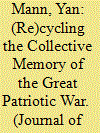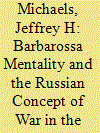| Srl | Item |
| 1 |
ID:
179756


|
|
|
|
|
| Summary/Abstract |
The cult of the ‘Great Patriotic War’ regularly cycled through all Soviet administrations after it was initially crafted under Stalin and became further entrenched in everyday life under Leonid Brezhnev. The popularity and appeal of the cult rested on the fact that it was created by a combination of efforts that included the state’s propaganda apparatus, as well as the editors and correspondents of leading newspapers, the latter of which consisted of some of the most talented authors in the Soviet Union. Stalin’s censorship ensured that the reading public was regularly exposed to only sanitized versions of the war that rarely dealt in nuance, but offered much in the form of heroic self-sacrifice by Red Army men and women with Stalin acting as the cornerstone of the Soviet war effort. Nikita Khrushchev’s Thaw saw a flood of literature on the war, but most continued to retain Stalin’s narrative, which Brezhnev’s regime reinforced with public commemorations and memorials. While Boris Yeltsin was able to move away from the cult after the fall of the Soviet Union, Vladimir Putin has repurposed it and put it to work for his administration, appealing to the public with Stalin era rhetoric recycled for present day needs.
|
|
|
|
|
|
|
|
|
|
|
|
|
|
|
|
| 2 |
ID:
179762


|
|
|
|
|
| Summary/Abstract |
The legacy of the Great Patriotic War, particularly the June 1941 ‘surprise’ attack, remains alive and well in contemporary Russia’s foreign and defense policies. Most notably, it serves as the basis for contemporary Russian ideas about ‘strategic deterrence’ and features as an underlying motive of Russia’s relationship with NATO. Even if the idea of a US/NATO initiation of war on the Russian Federation seems absurd, the fact this idea has remained alive and well for more than seven decades would seem to indicate that efforts to change this mindset, perhaps by revisiting the German invasion and demonstrating why a ‘21st century Barbarossa’ is indeed absurd, should be prioritized as part of any effort to improve NATO-Russia relations.
|
|
|
|
|
|
|
|
|
|
|
|
|
|
|
|
| 3 |
ID:
179758


|
|
|
|
|
| Summary/Abstract |
This article outlines how the Ukrainian political leadership has promoted the commemoration of WWII anew following Russia’s annexation of Crimea. It argues that the new commemorative practices reflect changes in Ukraine’s foreign policy, aiming to come closer to the (Eastern European) EU member states and to move away from Russia. The efforts of the Ukrainian authorities remain contradictory, however, as to some extent they disregard the EU’s remembrance of WWII and are reminiscent of the Russian commemoration of the Great Patriotic War.
|
|
|
|
|
|
|
|
|
|
|
|
|
|
|
|
| 4 |
ID:
179754


|
|
|
|
|
| Summary/Abstract |
Fighting over history is in season again in Eastern Europe. This year’s 75th anniversary of the end of World War II served as a particularly easy catalyst for revisionism. The year began ominously as Russian President Vladimir Putin, sitting around a table in the Kremlin, lectured leaders of the Commonwealth of Independent States (CIS) on the proper historical context of the outbreak of the war. That somewhat awkward encounter was itself a response to an earlier European Parliament resolution that advocated tearing down war monuments, insinuated that the Soviet Union shared culpability with Germany for instigating the war, and blamed Russia for ‘whitewashing crimes committed by the Soviet totalitarian regime’.
|
|
|
|
|
|
|
|
|
|
|
|
|
|
|
|
| 5 |
ID:
179753


|
|
|
| 6 |
ID:
179763


|
|
|
|
|
| Summary/Abstract |
Belarus, arguably Russia’s closest military ally, observably distanced itself from Russia’s actions early on during the Ukraine conflict. It maintained an ambiguous line about the annexation of Crimea, and its rhetoric toward NATO members became less hostile. Belarus’ actions can be explained within the framework of the alliance security dilemma as fears of both military and economic entrapment, but they also indicate how Belarus uses its alliance with Russia to protect its domestic political system. Importantly, an ostensibly neutral position on Ukraine — though in truth always closer to Russia than Ukraine — should not be mistaken for either aspirations of neutrality or perceptions of a threat from Russia.
|
|
|
|
|
|
|
|
|
|
|
|
|
|
|
|
| 7 |
ID:
179759


|
|
|
|
|
| Summary/Abstract |
Since the turn of the century, memories of the Second World War are undergoing institutionalization in all states of the Baltic Sea region. Official narratives promoted by the state often lose touch with grassroots memories, which results in a growing fragmentation of the memory domain and threatens national unity. Fragmentation can only be overcome by allowing for wider margins of debate, rather than additional regulation.
|
|
|
|
|
|
|
|
|
|
|
|
|
|
|
|
| 8 |
ID:
179765


|
|
|
|
|
| Summary/Abstract |
This article sets out to examine the inner working of combined-arms armies logistics over the course of the war through the use of a series of seven reports contained within the ‘Collection of Materials on the Experience of War’ and comparing these assessments with statistics from archival documents on two actual operations, Operation Polkovodets Rumyantsev in August 1943 and the Vistula-Oder Operation in January 1945. These results show that combined-arms armies gained their operational mobility from rapid re-establishment of railways and a carefully choreographed use of a small motor vehicle fleet, coupled with strict adherence to weight limits and living off the land by combat troops and their horse-drawn transport. This achievement of high mobility using limited means was a unique approach particularly tailored to the Red Army’s force structure and the Soviet Union’s available economic support.
|
|
|
|
|
|
|
|
|
|
|
|
|
|
|
|
| 9 |
ID:
179760


|
|
|
|
|
| Summary/Abstract |
This article sketches the multiple and often contradictory memories of the Soviet Union’s World War II. It suggests ways in which historians could deal with this cacophony of voices about this contested past.
|
|
|
|
|
|
|
|
|
|
|
|
|
|
|
|
| 10 |
ID:
179764


|
|
|
|
|
| Summary/Abstract |
The eventual decision by the Soviet military to dedicate a force to ‘special propaganda’ (or spetsprop) was sparked by disappointments in the pre-war campaigns, from the Far East to Finland between 1938 and 1940. Special propaganda represented one of the earliest forms of Soviet asymmetric warfare, one that would even outlive the Soviet state.
Stalin’s mass purge of the Soviet military, however, deprived special propaganda of the kind of officers it needed most: linguists and foreign area experts. The Soviet experience evidences the probable paradox that affects many totalitarian regimes’ efforts to influence audiences beyond their control: although propaganda is a critical element of their survival, their inherent insularity precludes the ability to understand the populations they seek to influence.
|
|
|
|
|
|
|
|
|
|
|
|
|
|
|
|
| 11 |
ID:
179757


|
|
|
|
|
| Summary/Abstract |
Why should we talk about history, memory, and commemorations of the Second World War? The farther in the past, the less painful memories should be, but contrary to these expectations, every new anniversary of the Victory in the Second World War brings about new ‘memory wars’ instead of reconciliation and pacification. What makes leaders born after the conflict so moved and emotionally involved in these debates? The answer is that ‘memory wars’ are not about the past; they are about the present and, even more so, about the future. Thus when in 2020 Russian policy makers talk about 1945 or 1939, they actually mean 1991 or 2024, which definitely makes it personal.
|
|
|
|
|
|
|
|
|
|
|
|
|
|
|
|
| 12 |
ID:
179755


|
|
|
|
|
| Summary/Abstract |
World War II is the major historical event of the last century that still resonates with Russians’ emotions due to the enormous sacrifice of the past generation and the main victory over Nazism it achieved. This article outlines the ways and steps made by the current political regime in Russia to appropriate War memory for its political purposes. It demonstrates how and for what reasons Putin’s propaganda went from the corrections of the war narrative to the retrenchment at the Soviet-time positions in the history wars with Russia’s neighbors, and lists the legislative measures restricting alternative visions of the history of the war. The article also analyses the negative impact of this historical politics on the Russian academia and society.
|
|
|
|
|
|
|
|
|
|
|
|
|
|
|
|
| 13 |
ID:
179761


|
|
|
|
|
| Summary/Abstract |
In the midst of a deepening argument about World War II between Russia and Eastern Europe, the situation in Asia looks more favorable for Moscow. To most of Russia’s neighbors in East Asia – China, Mongolia, both Koreas – the perception of WWII is well disposed to Moscow. But the situation in relations with its former opponent – Japan – is still quite sensitive. Although nowadays they are not entangled with harsh ‘memory wars’, the gap in both countries’ perception of WWII is still quite significant.
|
|
|
|
|
|
|
|
|
|
|
|
|
|
|
|